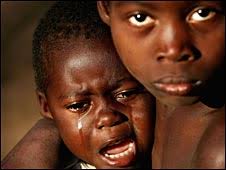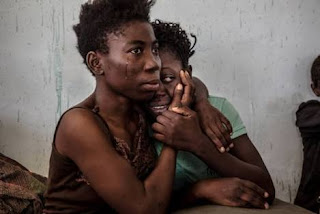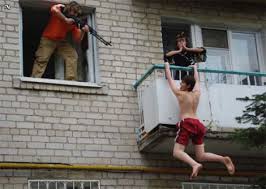Child Abuse
Oghenetega is lucky to be alive and to tell his story, because he too would have died if not for the kind gesture of a good Nigerian family. He was born in a fragmented family of five, two boys and three girls. His father passed away in 1990 and his mother followed suit in 2000. His stepmother took care of him for five years but she also died. Oghenetega’s troubles began when he lost his parents. No one was willing to look after him, but eventually one of his elder brothers transferred him to their uncle. The uncle was abusive and would not pay Oghenetega’s school fees. The uncle found a job for him at a local restaurant, even though he was only a child. He worked there for two months before his brother took him to stay with a friend of his step mother. Life seemed enjoyable at first as he went to school like other children but soon, she stopped him from going to school. Oghenetega returned to the restaurant where he had once worked but the situation was worse than before. In February, 2008, he started living on the streets of Warri, Delta State. He was forced to start distributing marijuana, something he wouldn’t have known and done if he was in a home and school. He started keeping ammunitions for armed robbers and would have been dead if not for the kind intervention of a good man and his wife who witnessed a robbery by the child and his adult gang and noticed he was forced to get into a building to provide access for the gang. Oghenetega was only 11 years old. The family took in Oghenetega and traced his family, but his paternal relatives refused to take him and he didn’t have any maternal relatives. So, he completed his primary education living with this new family. He continued to secondary level and is now in form two. Despite the sometimes harsh conditions at school, Oghenetega is sailing through and his performance shows hope for a bright future.
Today I will be talking about Child Abuse. This issue is growing rampant by the day especially in the developing countries. In recent decades, there has been extreme forms of violence against children, sexual abuse, sexual exploitation and female genital mutilation. Aside this, many children have routinely been exposed to physical, sexual and psychological violence in their school, home, work and their communities. This causes a devastating consequence to their health and wellbeing now and in the future. But what is Child Abuse?
According to the Centre for Disease Control and Prevention, it defines it as any act or series of acts of omission or commission by a parent or other caregiver that results in harm, potential for harm, or threat of harm to a child.
Statistics show that about 8 million children of school age are outside of school in Nigeria. Globally in 2014, 1 billion children aged 2-17 years experienced physical, sexual, emotional or multiple types of abuse. Every year, there are an estimated 41,000 homicide deaths in children under 15 years of age.
There are four major categories of child abuse:physical, emotional, neglect and sexual abuse.
Physical abuse
It can range from minor bruises to severe fractures or death from punching, hitting, beating, shaking, suffocating, poisoning, burning, drowning. Or when a parent or caregiver induces an illness in a child deliberately, when a child is exposed to cold, heat or radiation, when a child is exposed to a dangerous animal e.t.c.
Emotional abuse
Any behaviour that impairs a child's emotional development or sense of self esteem. It involves threats, constant criticisms, when you compare your child with another child, when you call your child foul names like "You are a stupid boy" or "Idiot come here" or you constantly tell your child that he/she is a good for nothing fool. Some teachers think that insulting a child will stimulate the child to be smart but this only demoralizes the child, when you laugh at them, mock them, embarrass them whether at home or in public. Overprotection is a form of emotional abuse; you cage your children and prevent them from going out and having friends. Bullying in schools is another form of emotional abuse. If you don't give love, support and guidance to your child, you are guilty of abuse.
Sexual abuse
This is a sad story told by a girl who lived on the same street as another until her death. “Shola was subjected into slavery. She started hawking sachet water to support the family. Shola must execute her chores which included washing of the clothes and dishes, cleaning the home and cooking at the end of her day’s sales. Life was miserable as the Ajobi children also tried to make her unhappy, but beyond these painful experiences, Shola was sometimes beaten up for flimsy reasons. The man of the house worsened Shola‘s case as he severally raped her. The last straw that broke the camels back was when she returned one evening from another day of sale only to meet the man of the house all alone. As usual, he wanted to have his way with her but this time she fought back. She was beaten to the pulp. The woman of the house who didn’t know what had transpired came into the house and saw her on the floor in tattered clothes crying bitterly and also pounced on her. Shola couldn’t take it any more and so she ran away from the house that night and was waylaid by a gang of hoodlums who raped her to death. She was only thirteen years of age.
Sexual abuse is any act that forces or entices a child or young person to participate in sexual activities, regardless of whether the child is aware of what is going on. Sexual abuse activities may include assault by penetrations such as rape, oral sex, anal sex e.t.c and non penetrating such as touching through the cloth, rubbing, kissing, masturbating. There are some non contact activities which are classed under sexual abuse such as encouraging a child to be watching porn, or telling the child to be dressing in a provocative manner or to be behaving sexually inappropriately e.t.c.
Child prostitution still occurs in countries like Brazil and Thailand. More than 200,000 children are still sexually exploited in those places. This negatively affects the children's sexual health, it causes psychological trauma and puts them at risk of enduring increased violence.
Neglect
More children suffer from neglect than from physical and sexual abuse combined. The National Society For Prevention Of Cruelty To Children defines Neglect as the persistent failure to meet a child's basic physical or psychological needs, likely to result in the serious impairment of the child's health or development. If a parent or caregiver does not respond to, or neglects a child's basic emotional needs, they are guilty of child neglect. A mother that does not feed her newborn child properly, does not protect the child from physical and emotional danger or does not provide shelter for this child is guilty of neglect.
Now, we know the different categories of child abuse. The question is, how can we stop this? Abuse is listed as one of the causes of child morbidity and mortality in the country. This needs to be stopped and we can stop this by:
1)Being a nurturing parent. Children need to know that they are loved, special and are capable of following their dreams.
2)Helping a friend, neighbour or relative. Someone you know may be struggling with his or her parenting responsibilities. Offer a helping hand in taking care of the children.
3)Providing support classes for parents, teaching them child care and parenting strategies, or helping with economic support and stability during times of difficulty, struggling parents and families need help and support.
4)Having faith based orgainzations, civic groups, schools,community leaders, local and state legislatures coming together to fight child abuse. A child abuse law enforcement should be made and a child abuse prevention team should be created in every area of the city.
5)Reporting. If you know of an incident of child abuse or domestic violence, it needs to be reported by you to the local authorities.
Every child is important; he or she doesn’t have to be yours to be loved. A little smile, a little patience on your part, a little tolerance, a little respect for them because they are like you but only very young and they would make us all proud in the nearest future if we can say NO to child abuse.
Today I will be talking about Child Abuse. This issue is growing rampant by the day especially in the developing countries. In recent decades, there has been extreme forms of violence against children, sexual abuse, sexual exploitation and female genital mutilation. Aside this, many children have routinely been exposed to physical, sexual and psychological violence in their school, home, work and their communities. This causes a devastating consequence to their health and wellbeing now and in the future. But what is Child Abuse?
According to the Centre for Disease Control and Prevention, it defines it as any act or series of acts of omission or commission by a parent or other caregiver that results in harm, potential for harm, or threat of harm to a child.
Statistics show that about 8 million children of school age are outside of school in Nigeria. Globally in 2014, 1 billion children aged 2-17 years experienced physical, sexual, emotional or multiple types of abuse. Every year, there are an estimated 41,000 homicide deaths in children under 15 years of age.
There are four major categories of child abuse:physical, emotional, neglect and sexual abuse.
Physical abuse
It can range from minor bruises to severe fractures or death from punching, hitting, beating, shaking, suffocating, poisoning, burning, drowning. Or when a parent or caregiver induces an illness in a child deliberately, when a child is exposed to cold, heat or radiation, when a child is exposed to a dangerous animal e.t.c.
Emotional abuse
Any behaviour that impairs a child's emotional development or sense of self esteem. It involves threats, constant criticisms, when you compare your child with another child, when you call your child foul names like "You are a stupid boy" or "Idiot come here" or you constantly tell your child that he/she is a good for nothing fool. Some teachers think that insulting a child will stimulate the child to be smart but this only demoralizes the child, when you laugh at them, mock them, embarrass them whether at home or in public. Overprotection is a form of emotional abuse; you cage your children and prevent them from going out and having friends. Bullying in schools is another form of emotional abuse. If you don't give love, support and guidance to your child, you are guilty of abuse.
Sexual abuse
This is a sad story told by a girl who lived on the same street as another until her death. “Shola was subjected into slavery. She started hawking sachet water to support the family. Shola must execute her chores which included washing of the clothes and dishes, cleaning the home and cooking at the end of her day’s sales. Life was miserable as the Ajobi children also tried to make her unhappy, but beyond these painful experiences, Shola was sometimes beaten up for flimsy reasons. The man of the house worsened Shola‘s case as he severally raped her. The last straw that broke the camels back was when she returned one evening from another day of sale only to meet the man of the house all alone. As usual, he wanted to have his way with her but this time she fought back. She was beaten to the pulp. The woman of the house who didn’t know what had transpired came into the house and saw her on the floor in tattered clothes crying bitterly and also pounced on her. Shola couldn’t take it any more and so she ran away from the house that night and was waylaid by a gang of hoodlums who raped her to death. She was only thirteen years of age.
Sexual abuse is any act that forces or entices a child or young person to participate in sexual activities, regardless of whether the child is aware of what is going on. Sexual abuse activities may include assault by penetrations such as rape, oral sex, anal sex e.t.c and non penetrating such as touching through the cloth, rubbing, kissing, masturbating. There are some non contact activities which are classed under sexual abuse such as encouraging a child to be watching porn, or telling the child to be dressing in a provocative manner or to be behaving sexually inappropriately e.t.c.
Child prostitution still occurs in countries like Brazil and Thailand. More than 200,000 children are still sexually exploited in those places. This negatively affects the children's sexual health, it causes psychological trauma and puts them at risk of enduring increased violence.
Neglect
More children suffer from neglect than from physical and sexual abuse combined. The National Society For Prevention Of Cruelty To Children defines Neglect as the persistent failure to meet a child's basic physical or psychological needs, likely to result in the serious impairment of the child's health or development. If a parent or caregiver does not respond to, or neglects a child's basic emotional needs, they are guilty of child neglect. A mother that does not feed her newborn child properly, does not protect the child from physical and emotional danger or does not provide shelter for this child is guilty of neglect.
Now, we know the different categories of child abuse. The question is, how can we stop this? Abuse is listed as one of the causes of child morbidity and mortality in the country. This needs to be stopped and we can stop this by:
1)Being a nurturing parent. Children need to know that they are loved, special and are capable of following their dreams.
2)Helping a friend, neighbour or relative. Someone you know may be struggling with his or her parenting responsibilities. Offer a helping hand in taking care of the children.
3)Providing support classes for parents, teaching them child care and parenting strategies, or helping with economic support and stability during times of difficulty, struggling parents and families need help and support.
4)Having faith based orgainzations, civic groups, schools,community leaders, local and state legislatures coming together to fight child abuse. A child abuse law enforcement should be made and a child abuse prevention team should be created in every area of the city.
5)Reporting. If you know of an incident of child abuse or domestic violence, it needs to be reported by you to the local authorities.
Every child is important; he or she doesn’t have to be yours to be loved. A little smile, a little patience on your part, a little tolerance, a little respect for them because they are like you but only very young and they would make us all proud in the nearest future if we can say NO to child abuse.









Very inspiring, we need to realize that our children are our hope for a better future, a better Nigeria. Its important that we guide them and show them love.
ReplyDelete